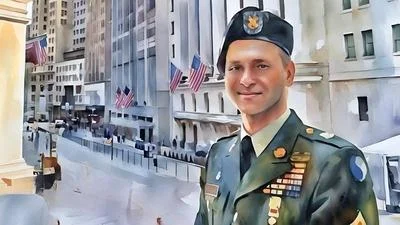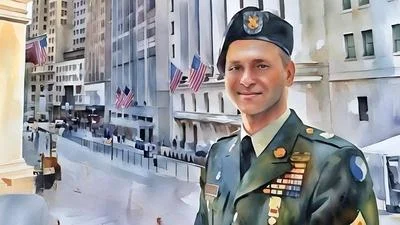As Ukraine’s war with Russia grinds on into its fourth year, a conversation is emerging about what long-term independence and security really mean—not only for Kyiv, but for its Western allies as well. Can a sovereign nation endure on foreign aid and borrowed weapons? Should civil defense include not just armies, but armed citizens? And is Russia’s war in Ukraine the opening salvo in a broader global offensive that includes cyberattacks, narcotics, and migration destabilization?
These questions are top-of-mind for Maryan Zablotskyy, a People’s Deputy in Ukraine’s Verkhovna Rada. From his position as a legislator and close ally of pro-Western reformers, Zablotskyy champions a vision of Ukrainian sovereignty rooted in military capability, but also civic strength, tax reform, and constitutional democracy. At the heart of his platform is a message Western audiences may find familiar and unsettling. In his view, peace through strength begins with a rifle in every home.
Zablotskyy was elected under the Servant of the People party. He is known not for his economic and legislative work, and for his passionate advocacy of Ukrainian sovereignty, personal freedoms, and Western-style governance. As a prominent voice in American policy circles, he uses his platform to provide firsthand insight into Ukraine’s ongoing war with Russia and to champion bold ideas for the country’s future.
Zablotskyy is quick to praise Ukraine’s most recent attack on Russia’s air fleet. “Universally acclaimed for its professional execution and for the impact that it had,” he says. The operation, launched from deep inside Russia, involved rented warehouses, dispersed trucks, and perfectly synchronized timing. “Within the span of ten minutes, basically all were launched,” he recalls. One detail he notes—unreported in most Western media—is the Russian response: “They lynched one of the drivers who was actually oblivious to what was happening.”
Zablotskyy emphasizes this is just one example in a pattern of successful Ukrainian strikes, including operations against the Crimean Bridge and Russia’s Black Sea Fleet. These attacks, he believes, do more than degrade enemy capacity—they energize allies. “The biggest effect was for the Western audience… there is a lot of admiration for that,” he explains, citing widespread media coverage and public support in the U.S. and Europe. “We like the underdog, and we like when the underdog bites.”
He credits this effectiveness with increasing Western confidence in Ukraine. “It was very clear that Ukrainians were quite capable… We can, you know, sell drones from Ukraine,” he says, adding that after seeing Ukraine’s capabilities, foreign partners are more willing to cooperate on defense.
The war, he says, has also renewed admiration for the philosophy of “peace through strength.” A portrait of Ronald Reagan hangs behind him as he speaks. “I owe him many years of my freedom,” Zablotskyy says. He praises Reagan’s economic pressure campaign against the USSR and hopes to honor him with a statue in Kyiv—an effort he’s already initiated. “We gathered the necessary 6,000 signatures online,” he notes, “and I already successfully fundraised for that.”
Despite the hardships of war, Zablotskyy is firmly committed to democratic values. Responding to Western criticism about the suspension of elections, he points to constitutional law and public opinion. “Our Constitution clearly forbids elections during a period of war,” he explains. But more importantly, he says, “More than 80% of Ukrainians oppose having an election.” If that changed, he insists, elections would follow: “This is the provision of democracy.”
A long-time advocate of tax reform, Zablotskyy’s says he was aided by Grover Norquist, the American anti-tax crusader. Zablotskyy supports a broad-based flat tax modelled after the 2017 U.S. reforms. “Flat rate, broad base with fewer exemptions,” he says. His goal is, “I do not want Ukraine to rely too much on Western aid.” With reform, he says, “we wouldn't be sitting on your shoulders.”
Perhaps his most passionate belief, however, is in the need for gun ownership rights. “I admire your Second Amendment greatly,” Zablotskyy declares. In his view, the U.S. “is basically an inviolable [nation] even without the armed forces,” because of the Amendment. He wants “a rifle in every home, one for every civilian,” citing the example of Swiss neutrality and resilience. “Switzerland was not in any war for the last 1,000 years for a simple reason—because every single person there is armed.” In summary, “Firearms, that’s the best security guarantee for Ukraine,” he says.
As for Russia, Zablotskyy sees its economy as unsustainable and its ambitions rooted in mythology. “Their economy does look something like National Socialism,” he says, accusing the Kremlin of cooking numbers through state-owned banks. “According to our best estimates, their economy cannot last for more than a year of this.”
He’s also concerned about a threat looming beyond Europe. “Russia recruited at least 5,000 Cuban mercenaries… and recruited 20,000 more,” he warns. These fighters, once battle-hardened, could return to the Western Hemisphere and become tools for cartels and hostile regimes. “We already see that even with illegal migration… it was deliberate, orchestrated by Russian allies and Russia itself.”
He believes this is important to America, because “the U.S. is already under attack… fentanyl is delivered by cartels that are supported by Russia and China.” According to Zablotskyy, migration trends have shifted dramatically. “A decade ago, 90% of your illegal migrants were from Mexico… now most… come from Venezuela, Cuba, and Nicaragua.”
To him, it’s all connected—the battlefield in Ukraine, hybrid warfare in America, and the alliances between hostile regimes. “They pretend to be friends… but behind the scenes, they still want you all to die,” he says.









